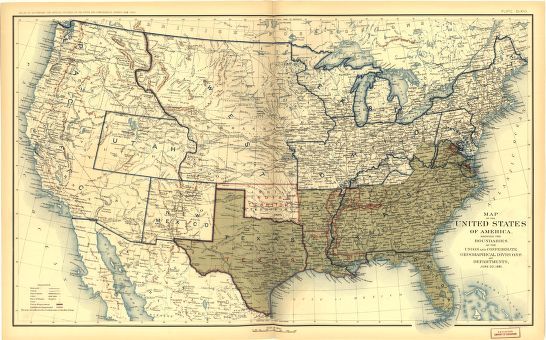 Baptist newspapers North and South greet the new year in various ways.
Baptist newspapers North and South greet the new year in various ways.
Northern Baptist newspapers are generally optimistic about the year that lies ahead, while Baptist newspapers of the South run editorials ranging from despair to ambivalence to defiance.
Will the United States prove capable of putting down the rebellion this year?
What does the Confederacy need to do to placate God’s wrath, reverse the course of the war of late, and bring about victory for the South as ordained according to Divine Providence?
The outlook in the North is positive enough that the Michigan Baptist Christian Herald looks forward to a growth in subscriptions:
A Happy New Year to the Herald! Are our sandals bound on for canvassing our city, village or neighborhood for new subscribers? Are our purse strings already loosened for advance payment? If so be assured it will be a Happy New Year for the Christian Herald. There will be good tidings of great joy that the quota of 5,000 subscribers is early filled. . . . Brethren, we can live better, pray better, preach better, do more good and be more happy by making 1864 a Happy New Year to the Michigan Christian Herald. Shall we do it?
L. H. Trowbridge.
Whereas the ravages of war are not evident upon the Michigan landscape, this is not the case in the Deep South. Against a backdrop of months of battlefield losses and mounting home front destitution, this week’s edition of the South Carolina Confederate Baptist greets the new year with ambivalence, maintaining the view that both darkness and peace can dwell side-by-side.
It is possible to realize the apparent contradiction implied in the words of the apostle, “as sorrowful, yet always rejoicing.” Faith in God may so elevate the soul above the turmoil and strife and cares of earth, that it will become the abode of serene and continuous enjoyment. The future may appear dark, but all its events are to brought out by infinite wisdom and goodness, and he who realizes the fact may keep his “soul in perfect peace, being stayed upon God.”
The ambivalence extends even to the Confederate Army.
Accounts from every quarter tell of destruction of property by soldiers, Federal and Confederate. From the former this was to have been expected; but Confederate soldiers were, and ought to have been, hailed as protectors and friends. In all armies, there are vile and unprincipled men, who take advantage of their position to oppress and plunder and it becomes, the body of the soldiery, who are men of virtue and honor, place the stamp of their indignant reprobation upon practices so incompatible with the instincts of a gentlemen. We would most respectfully, yet earnestly, call the attention of our soldiers to this subject. The chaplains of Gen. Bragg’s army have already made their appeal. Let our soldiers reflect that the kind feelings of their friends are often checked by the outrages which are committed upon their property, and its wanton destruction by the thoughtless or the malicious. Whenever our soldiers conduct themselves properly, they will be honored and favored; but if they imitate the Yankees in vandalism, they need not be surprised if they are treated with similar neglect and contempt.
Such words of consolation and concern are a far cry from the triumphant and joyful Southern Baptist newspaper editorials that greeted the new year of two years earlier, at a time when Confederate triumphs had instilled great confidence among white southerners.
If the emotions prevalent at the beginning of this year are any indication, 1864 will be a pivotal year.
Sources: History of Baptists in Michigan, p. 95, 101-102 (link); “The New Year” and “Vandalism,” Confederate Baptist, January 6, 1863


